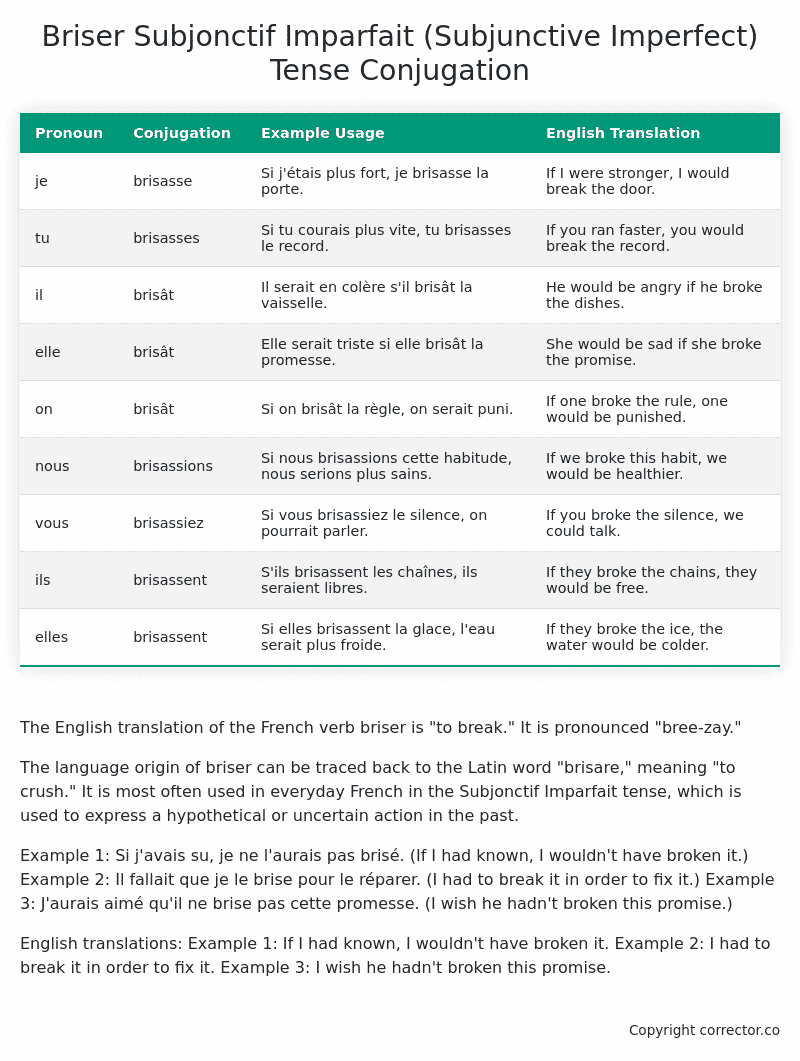Subjonctif Imparfait (Subjunctive Imperfect) Tense Conjugation of the French Verb briser
Introduction to the verb briser
The English translation of the French verb briser is “to break.” It is pronounced “bree-zay.”
The language origin of briser can be traced back to the Latin word “brisare,” meaning “to crush.” It is most often used in everyday French in the Subjonctif Imparfait tense, which is used to express a hypothetical or uncertain action in the past.
Example 1: Si j’avais su, je ne l’aurais pas brisé. (If I had known, I wouldn’t have broken it.)
Example 2: Il fallait que je le brise pour le réparer. (I had to break it in order to fix it.)
Example 3: J’aurais aimé qu’il ne brise pas cette promesse. (I wish he hadn’t broken this promise.)
English translations:
Example 1: If I had known, I wouldn’t have broken it.
Example 2: I had to break it in order to fix it.
Example 3: I wish he hadn’t broken this promise.
Table of the Subjonctif Imparfait (Subjunctive Imperfect) Tense Conjugation of briser
| Pronoun | Conjugation | Example Usage | English Translation |
|---|---|---|---|
| je | brisasse | Si j’étais plus fort, je brisasse la porte. | If I were stronger, I would break the door. |
| tu | brisasses | Si tu courais plus vite, tu brisasses le record. | If you ran faster, you would break the record. |
| il | brisât | Il serait en colère s’il brisât la vaisselle. | He would be angry if he broke the dishes. |
| elle | brisât | Elle serait triste si elle brisât la promesse. | She would be sad if she broke the promise. |
| on | brisât | Si on brisât la règle, on serait puni. | If one broke the rule, one would be punished. |
| nous | brisassions | Si nous brisassions cette habitude, nous serions plus sains. | If we broke this habit, we would be healthier. |
| vous | brisassiez | Si vous brisassiez le silence, on pourrait parler. | If you broke the silence, we could talk. |
| ils | brisassent | S’ils brisassent les chaînes, ils seraient libres. | If they broke the chains, they would be free. |
| elles | brisassent | Si elles brisassent la glace, l’eau serait plus froide. | If they broke the ice, the water would be colder. |
Other Conjugations for Briser.
Le Present (Present Tense) Conjugation of the French Verb briser
Imparfait (Imperfect) Tense Conjugation of the French Verb briser
Passé Simple (Simple Past) Tense Conjugation of the French Verb briser
Passé Composé (Present Perfect) Tense Conjugation of the French Verb briser
Futur Simple (Simple Future) Tense Conjugation of the French Verb briser
Futur Proche (Near Future) Tense Conjugation of the French Verb briser
Plus-que-parfait (Pluperfect) Tense Conjugation of the French Verb briser
Passé Antérieur (Past Anterior) Tense Conjugation of the French Verb briser
Futur Antérieur (Future Anterior) Tense Conjugation of the French Verb briser
Subjonctif Présent (Subjunctive Present) Tense Conjugation of the French Verb briser
Subjonctif Passé (Subjunctive Past) Tense Conjugation of the French Verb briser
Subjonctif Imparfait (Subjunctive Imperfect) Tense Conjugation of the French Verb briser (this article)
Subjonctif Plus-que-parfait (Subjunctive Pluperfect) Tense Conjugation of the French Verb briser
Conditionnel Présent (Conditional Present) Tense Conjugation of the French Verb briser
Conditionnel Passé (Conditional Past) Tense Conjugation of the French Verb briser
L’impératif Présent (Imperative Present) Tense Conjugation of the French Verb briser
L’infinitif Présent (Infinitive Present) Tense Conjugation of the French Verb briser
Struggling with French verbs or the language in general? Why not use our free French Grammar Checker – no registration required!
Get a FREE Download Study Sheet of this Conjugation 🔥
Simply right click the image below, click “save image” and get your free reference for the briser Subjonctif Imparfait tense conjugation!

Briser – About the French Subjonctif Imparfait (Subjunctive Imperfect) Tense
Formation
Common Everyday Usage Patterns
Interactions with Other Tenses
Subjonctif Présent
Indicatif Passé Composé
Conditional
Conditional Perfect
Summary
I hope you enjoyed this article on the verb briser. Still in a learning mood? Check out another TOTALLY random French verb conjugation!


